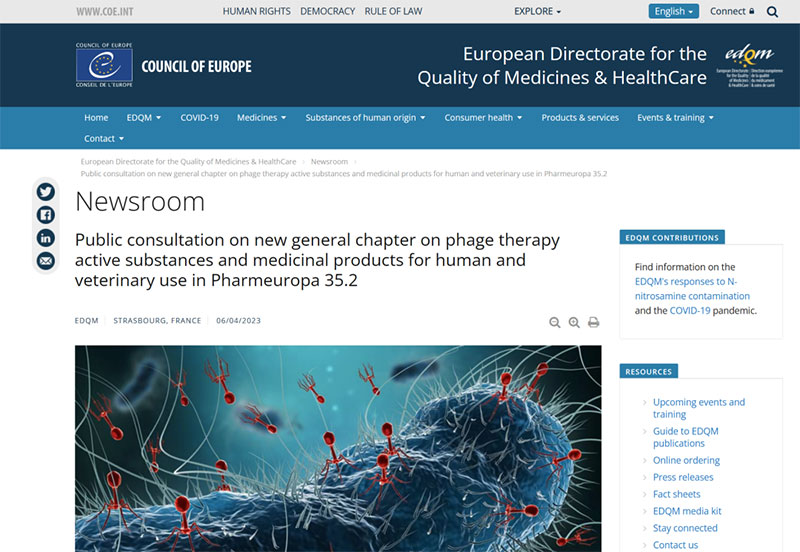[Important Announcement] Inclusion of Bacteriophage Therapy Active Substances and Medicinal Products for Human and Veterinary Use in Pharmacopoeia
Preface
In June 2021, during its 170th session, the European Pharmacopoeia Commission (EPC) unanimously decided to introduce a new general chapter titled "Bacteriophage Therapy Active Substances and Medicinal Products for Human and Veterinary Use (5.31)." This responsibility was assigned to the newly formed Bacteriophage Working Group (BACT WP). The draft of this chapter has been formulated and is currently open for public consultation in Europe until the end of June. This marks a significant inclusion of bacteriophage therapy active substances/products in the pharmacopoeia.

1-1. Definition
Bacteriophages are viruses that infect bacteria, relying on their bacterial hosts for replication. Comprising a genome of single or double-stranded DNA or RNA enveloped in a protein coat, bacteriophages serve as the foundation for Bacteriophage Therapy Medicinal Products (PTMPs). These are formulations, whether naturally occurring or genetically modified, used to treat bacterial infections or other medical conditions in humans or animals. PTMPs may consist of a single type of bacteriophage therapy active substance, a mixture of bacteriophages, or a combination with excipients. The administration of PTMPs can occur through various routes, resulting in different formulations.
1-2. Production
Bacteriophages are obtained by replicating within bacterial host strains and are purified using appropriate methods. The production process must yield consistent quality and stable PTMPs. Appropriate in-process testing should be implemented at relevant time points and/or critical intermediate stages during the production process. The production of PTMPs is anchored in a qualified seed batch system employing a validated host-bacteriophage combination.
2-1. General Provisions
Bacteriophages are acquired through replication within bacterial host strains and purified using appropriate methods. The production process must generate consistent quality and stable PTMPs. Suitable in-process testing should be implemented at relevant time points and/or critical intermediate stages during the production process. The production of PTMPs is based on a qualified seed batch system using a validated host-bacteriophage combination.
2-2. Bacterial Master Cell Banks and Working Cell Banks
Bacterial host cells employed in PTMP production must undergo thorough characterization at the strain level, including the strain source, subsequent operations, and tests used for strain identification. Bacterial cells for PTMP production originate from a qualified Bacterial Master Cell Bank (MCB), which must be monoclonal and meet specific requirements:
- Microbial Purity: Determine the presence of microbial contaminants through plating or other appropriate methods.
- Identification: Characterize the bacterial strain using suitable phenotypic and genotypic methods, preferably whole-genome sequencing, biochemical or molecular genetic tests, or mass spectrometry analysis. The typing should include antibiotic sensitivity profiles and nucleotide sequences of its chromosomal and plasmid DNA. Avoid using strains encoding contaminants (e.g., original bacteriophages) or other harmful factors (e.g., antibiotic resistance determinants, toxins) in PTMP production unless there is a valid reason and authorization.
- Cell Viability: The number of viable cells is determined by plate counting or other suitable methods for counting viable cells.
- Bacteriophage Sensitivity: Demonstrate the strain's sensitivity to bacteriophage therapy active substances through plaque assays or other suitable methods.
- No Adverse Bacteriophages: Confirm the absence of bacteriophages that may be adverse to PTMPs (such as lytic bacteriophages).
The Working Cell Bank used for production is a clone derivative of the Master Cell Bank and meets requirements for viability, microbial purity, and bacteriophage sensitivity.
2-3. Bacteriophages Used for PTMP Production
Bacteriophages used in PTMP production must undergo extensive characterization. Information about the bacteriophage's source, nucleotide sequence, and susceptible bacterial species must be provided. Avoid using bacteriophages encoding known or potential harmful genetic elements, such as antibiotic resistance determinants, toxins, lytic modules, or other elements, unless there is a valid reason and authorization.
Only Master Phage Banks that meet specific requirements can be used for production:
- Identification: Bacteriophages are characterized using suitable phenotypic and genotypic methods.







